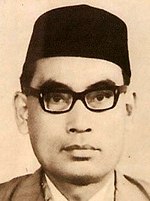Burhanuddin al-Helmy
Burhanuddin al-Helmy | |
|---|---|
| برهان الدين بن محمد نور الحلمي | |
 | |
| 1st Leader of the Opposition | |
| In office 1959–1964 | |
| Monarchs | Abdul Rahman Hisamuddin Putra |
| Prime Minister | Tunku Abdul Rahman |
| Succeeded by | Tan Chee Khoon |
| 3rd President of the Malaysian Islamic Party | |
| In office 1956 – 25 October 1969 | |
| Preceded by | Abbas Alias |
| Succeeded by | Mohd Asri Muda |
| Personal details | |
| Born | 29 August 1911 Kota Bharu, Gopeng, Perak, Federated Malay States (now Malaysia) |
| Died | 25 October 1969 (aged 58) Taiping, Perak |
| Political party | Kesatuan Melayu Muda Parti Kebangsaan Melayu Malaya Pan-Malaysian Islamic Party |
| Parent(s) | Muhammad Nur Sharifah Zaharah Habib Osman |
Dato' Seri Dr. Burhanuddin bin Muhammad Nur al-Hilmi (Jawi: برهان الدين بن محمد نور الحلمي; 29 August 1911 – 25 October 1969),[1] commonly known as Burhanuddin al-Helmy, was a Malaysian politician. He was President of the Malaysian Islamic Party (PAS) from 1956 to his death in October 1969.
Early and personal life[edit]
Burhanuddin was born in Kota Bharu, Perak in 1911. His father, Muhammad Nur came from West Sumatra, while his mother from Malacca and he studied at India's Aligarh Muslim University.[2] After his return from India, he taught Arabic at Madrasah Aljunied Al-Islamiah, Aljunied, Singapore. During his time in Singapore, he was arrested by the British, but was bailed out after one night by a member of the Alsagoff family.
Post-war activism[edit]
After World War II, Burhanuddin set up the Malay Nationalist Party. The party advocated Malay rights and proposed a "political union" with Indonesia.[2][3]
PAS Presidency[edit]
Burhanuddin assumed the presidency of PAS in 1956,[2] and held the post until his death in 1969.[4] He won the Besut parliamentary seat in the 1959 elections. PAS had a left-wing orientation under Burhanuddin's leadership: he supported trade unions and anti-colonialism.[5] He has been described as a "radical nationalist and Islamic thinker".[6] His presidency was interrupted by his arrest under the Internal Security Act in 1965 and subsequent imprisonment for one year on charges of plotting to overthrow the Malaysian government and install an Indonesian-friendly replacement.[2][7]
Election results[edit]
| Year | Constituency | Candidate | Votes | Pct | Opponent(s) | Votes | Pct | Ballots cast | Majority | Turnout | ||
|---|---|---|---|---|---|---|---|---|---|---|---|---|
| 1959 | P025 Besut, Trengganu | Burhanuddin al-Helmy (PMIP) | 9,988 | 70.32% | Husin Abdullah (UMNO) | 4,216 | 29.68% | 14,409 | 5,772 | 67.33% | ||
Legacy[edit]
Awards[edit]
 Perak:
Perak:
 Knight Grand Commander of the Order of the Perak State Crown (SPMP) – Dato' Seri (2015)
Knight Grand Commander of the Order of the Perak State Crown (SPMP) – Dato' Seri (2015)
Places named after him[edit]
Several places were named after him, including:
- Jalan Burhanuddin Helmi in Taman Tun Dr Ismail, Kuala Lumpur
- Persiaran Burhanuddin Helmi in Taman Tun Dr Ismail, Kuala Lumpur
- Sekolah Menengah Kebangsaan Doktor Burhanuddin in Taiping, Perak
- Sekolah Rendah Islam Burhanuddin Al-Helmy in Alor Setar, Kedah
- Kolej Burhanuddin Helmi, one of the residential college in National University of Malaysia, Bangi, Selangor
References[edit]
- ^ Profile of Burhanuddin al-Helmy
- ^ a b c d Leifer, Michael (2001). Dictionary of the modern politics of South-East Asia (3rd ed.). Taylor & Francis. p. 79. ISBN 0-415-23875-7.
- ^ Federspiel, Howard M. (2007). Sultans, shamans, and saints: Islam and Muslims in Southeast Asia. University of Hawaii Press. p. 177. ISBN 978-0-8248-3052-6.
- ^ "That complex entity called Pas". Aliran Monthly. 14 November 2009. Retrieved 22 June 2010.
- ^ Farish Noor (11 April 2008). "On the road to change?". Daily Times. Retrieved 22 June 2010.
- ^ Matheson Hooker, Virginia; Norani Othman (2003). Malaysia: Islam, society and politics. Institute of Southeast Asian Studies. p. 222. ISBN 981-230-161-5.
- ^ "Opposition Plan for Rebellion". The Age. Fairfax Media. 1 March 1965. Retrieved 22 June 2010. [dead link]
- 1911 births
- Presidents of Malaysian Islamic Party
- Malaysian people of Malay descent
- 1969 deaths
- Prisoners and detainees of Malaysia
- Malaysian people of Arab descent
- Malaysian people of Minangkabau descent
- People from Perak
- Members of the Dewan Rakyat
- Malaysian political party founders
- Leaders of the Opposition (Malaysia)
- Muslim socialists
